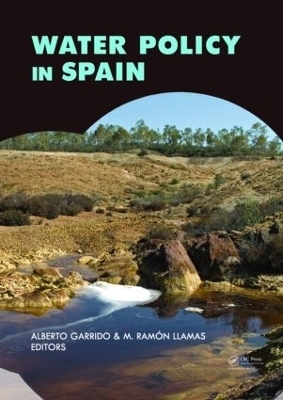
Water Policy in Spain
CRC Press (Verlag)
978-0-415-55411-4 (ISBN)
Though the modern Spanish State was formed in the mid Fifteenth Century, historical records show that water works, statues, and the utilization of water dates back to centuries BC. As a semi-arid country, the effort to control, store and assure water supplies to cities and fields is present in numerous historical and political landmarks.
Water policy in Spain has been the focus of Spanish-speaking scholars for decades, yet a comprehensive treatment of the subject has never before been published in English. Water Policy in Spain fills this gap by providing readers with a comprehensive, detailed account of the history of water policy in Spain from the beginnings of the 20th century to the present day.
Part one presents a synopsis of the physical, economic, environmental and climatic bases of Spain, also covering corresponding political topics. Part two reviews the major constraints and opportunities that are relevant to face major water policy challenges. And part three is an in-depth account of water policy in the country.
The issues closely examined include the way in which old water laws and institutions have been able to adapt to new sentimental and institutional challenges, including the significant change in the last decade to comply with the European Union’s Water Framework Directive (WFD). Like many semi-arid countries, climate change, drought risks and water pollution are cause for growing concerns in Spain and the country is still struggling to define a consistent and widely accepted set of policies to combat these threats. Spain’s current water policy is unique because it entails a complete tour de force with respect to what the country has been doing on water matters for centuries. As the WFD must be enforced in 27 States (representing 500 million Europeans), the lessons that can be learnt from the Spanish experience should catch the attention of water practitioners around the world.
M. Ramón LLAMAS is Emeritus Professor of Hydrogeology at the Complutense University of Madrid, Spain. He is a Fellow of Spain’s Royal Academy of Sciences, where he chairs the Section of Natural Sciences and the International Relations Committee. Professor Llamas is author of one hundred books or monographs and almost two hundred scientific papers. He was President of the International Association of Hydrogeologists (1984-1989), Vice-president of the International Water Resources Association (2001-2003) and Fellow of the European Academy of Sciences and Arts (2004). Alberto GARRIDO is an Associate Professor of Agricultural and Resource Economics at the Technical University of Madrid, Spain. His work focuses on natural resource and water economics and policy. He has conducted consultancy work for OECD, IADB, the European Parliament, European Commission, FAO, and various Spanish Ministries and autonomous communities. He is author of 100 academic references.
1. Scope and objectives Part I. The natural resource base, the environment and the economy 2. Physical and Hydrological Characteristics 3. The State of Water Ecosystems 4. Major Processes Degrading Freshwater Resources and Ecosystems 5. Water Uses in Transition 6. Water Footprint and Virtual Water Trade in SpainPart II. Constraints and social perceptions 7. Drought and Climate Risks 8. Water Supply in Urban Areas 9. Changing Water Discourses in a Modern SocietyPart III. Water Law, Institutions and Policies 10. Water Sector Regulation and Liberalization 11. The Foundations and Principles of Modern Water Law 12. Institutions and Institutional Reform in the Spanish Water Sector: a Historical Perspective 13. Trends in Water Pricing and Markets 14. Issues Related to Intensive Groundwater Use 15. Making Groundwater Institutionally Visible 16. Facing the Challenges of Implementing the European Water Directive in Spain 17. Public Participation in Developing and Improving Water Governance 18. The Spanish and Portuguese Cooperation over their Transboundary Basins 19. The end of Large-Scale Water Projects Part IV. Conclusions 20. Meeting Future Water Challenges: Spain’s Strengths and WeaknessesAuthor index
| Erscheint lt. Verlag | 11.8.2009 |
|---|---|
| Zusatzinfo | 30 Tables, black and white; 20 Illustrations, black and white |
| Verlagsort | London |
| Sprache | englisch |
| Maße | 174 x 246 mm |
| Gewicht | 612 g |
| Themenwelt | Naturwissenschaften ► Biologie ► Ökologie / Naturschutz |
| Naturwissenschaften ► Geowissenschaften ► Hydrologie / Ozeanografie | |
| Sozialwissenschaften ► Politik / Verwaltung ► Staat / Verwaltung | |
| Technik ► Bauwesen | |
| Technik ► Umwelttechnik / Biotechnologie | |
| ISBN-10 | 0-415-55411-X / 041555411X |
| ISBN-13 | 978-0-415-55411-4 / 9780415554114 |
| Zustand | Neuware |
| Informationen gemäß Produktsicherheitsverordnung (GPSR) | |
| Haben Sie eine Frage zum Produkt? |
aus dem Bereich


